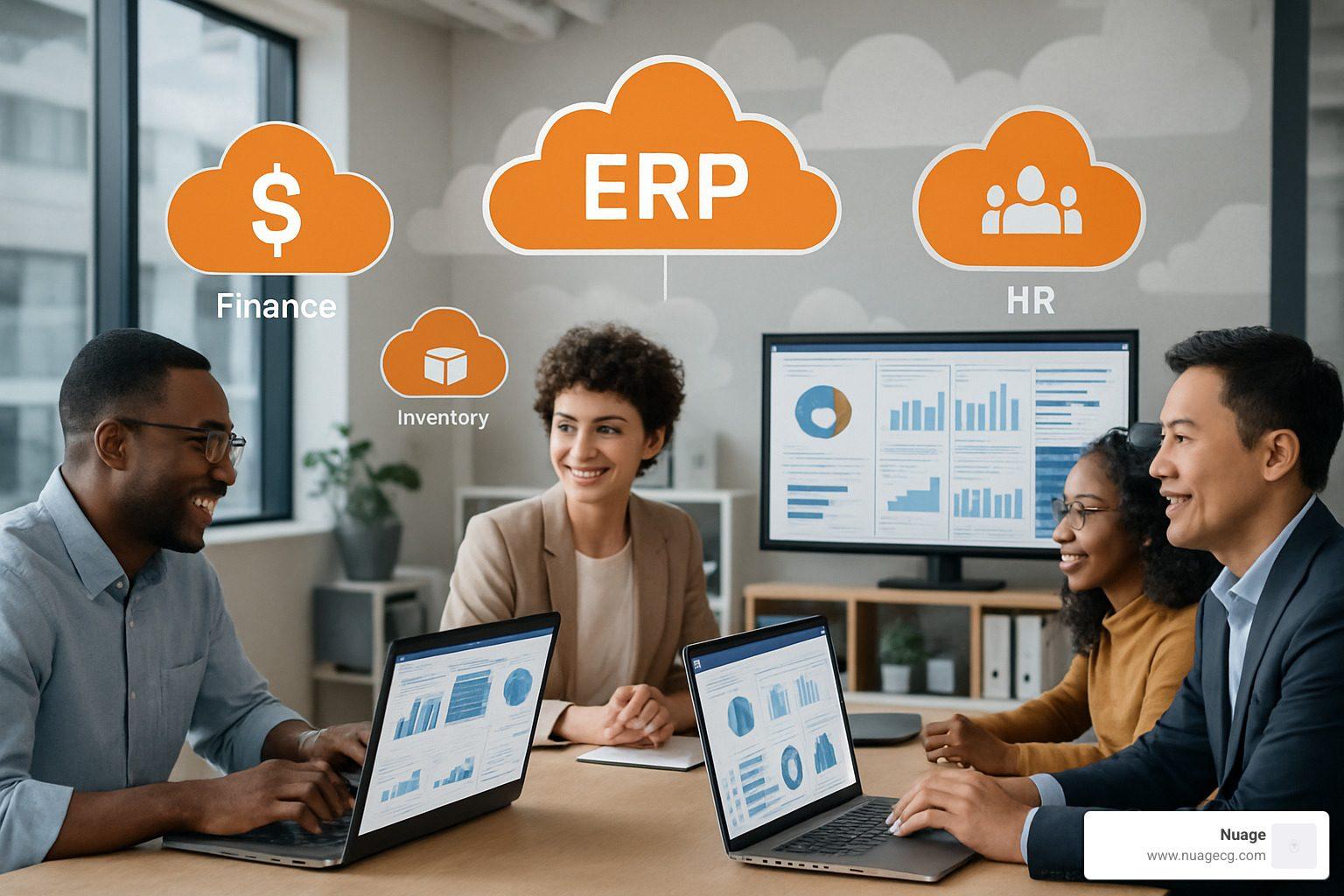What is a Cloud ERP System?
A cloud ERP system is a software solution that manages core business processes through internet-based access rather than on-premise servers. It provides a unified platform for finance, inventory, manufacturing, HR, and other critical operations.
Cloud ERP System at a Glance:
– Definition: Enterprise Resource Planning software hosted in the cloud and accessed via internet
– Delivery Model: Software-as-a-Service (SaaS) with subscription-based pricing
– Key Benefit: Anywhere, anytime access to critical business data
– Implementation: Faster deployment compared to on-premise solutions (typically 3-12 months)
– Security: Often more secure than on-premise with professional 24/7 monitoring
– Updates: Automatic and regular, managed by the vendor
As businesses of all sizes seek greater agility, cloud ERP systems have become essential infrastructure—as critical as electricity for keeping operations running smoothly. In fact, a recent survey found that 63% of businesses now choose cloud ERP over traditional on-premise installations, recognizing the value of real-time data access, reduced IT overhead, and the ability to support remote workforces.
“Cloud ERP systems are as indispensable to modern businesses as electricity is to keeping the lights on,” notes one industry expert, highlighting how deeply integrated these systems have become in successful operations.
Unlike traditional ERP that requires substantial server infrastructure and IT support, cloud ERP eliminates these capital expenses. Companies can redirect resources from maintaining hardware to strategic initiatives that drive growth. This shift from CapEx to OpEx (operational expenditure) proves particularly valuable for manufacturing businesses looking to modernize operations without massive upfront investment.
The cloud model also delivers rapid innovation. With vendors managing updates and security, businesses gain access to new features and technologies—like AI, machine learning, and IoT integration—without disruptive upgrade cycles.
I’m Louis Balla, CRO and partner at Nuage with over 15 years of experience helping manufacturing businesses implement and optimize cloud ERP systems for maximum ROI and operational efficiency. My expertise in NetSuite strategic alignment and third-party integrations gives me unique insight into how manufacturing businesses can leverage cloud ERP systems to drive changeal growth.
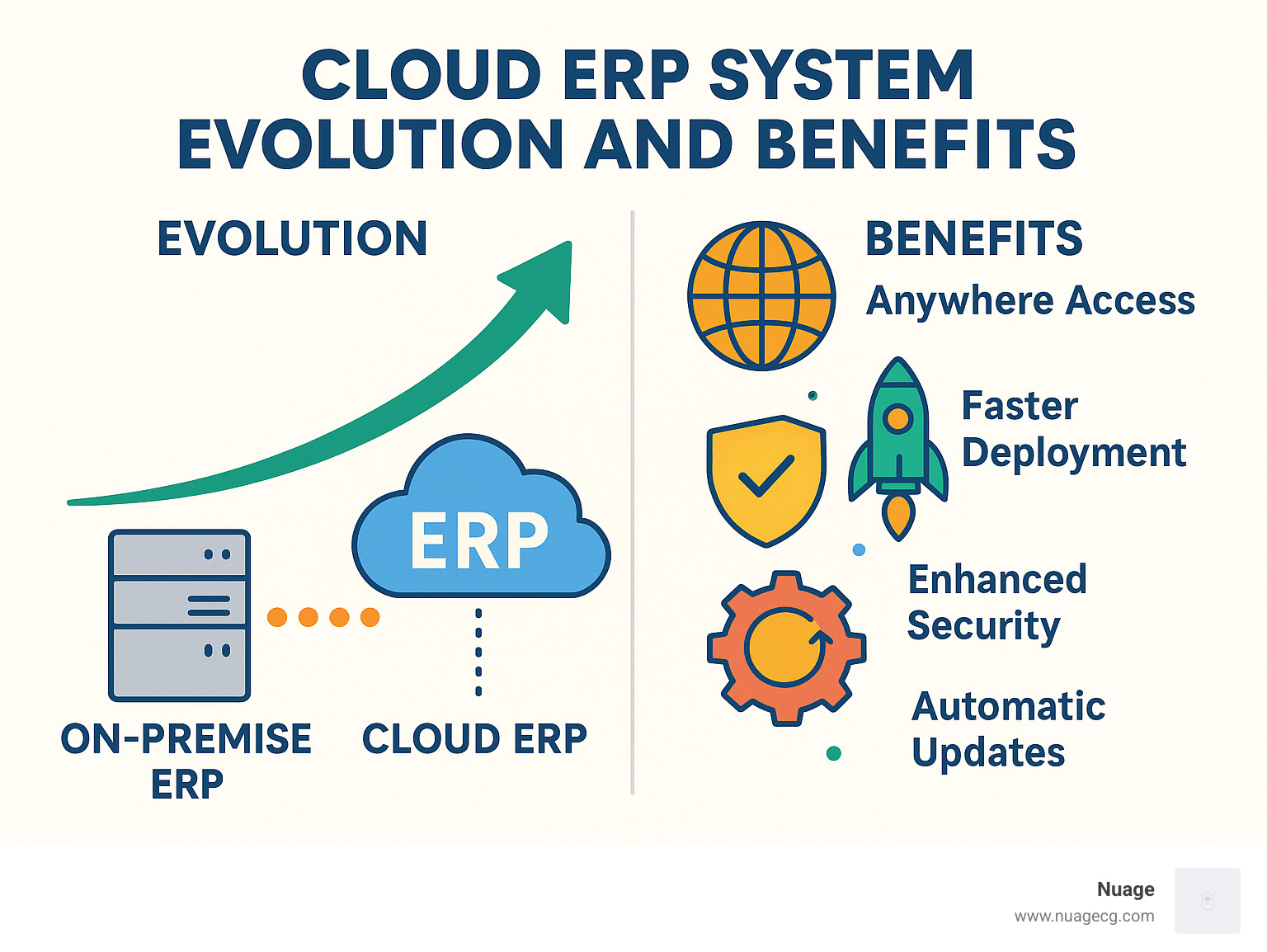
Understanding the Cloud ERP System Basics
From paper ledgers to digital powerhouses – that’s the remarkable journey of ERP systems since the Economic Order Quantity (EOQ) model first appeared in 1913. What once required mountains of paperwork and manual calculations has transformed into sophisticated digital ecosystems that seamlessly manage entire enterprises.
Today’s cloud ERP system delivers comprehensive business management capabilities through a Software-as-a-Service (SaaS) model. Rather than installing software on your own servers, everything lives in the cloud, accessible whenever and wherever you need it. This shift is more than just technical—it fundamentally changes how businesses invest in technology, moving from large upfront capital expenditures (CapEx) to more manageable operational expenditures (OpEx).
Think of it like the difference between buying a generator versus simply paying for electricity as you use it. The latter approach gives you more flexibility and less maintenance headaches!
Most cloud ERP systems employ what’s called multi-tenant architecture, where multiple customers share the same application while maintaining strict data separation. It’s similar to how apartment buildings work—everyone has their private space, but the overall structure and utilities are shared, creating efficiency. This approach allows vendors to achieve economies of scale, passing cost savings to you while maintaining higher security standards than many organizations could achieve on their own.
How Does a Cloud ERP System Work?
A cloud ERP system operates fundamentally differently than traditional on-premise solutions. Instead of software living on your own servers, it runs on the vendor’s infrastructure and comes to you through web browsers or mobile apps.
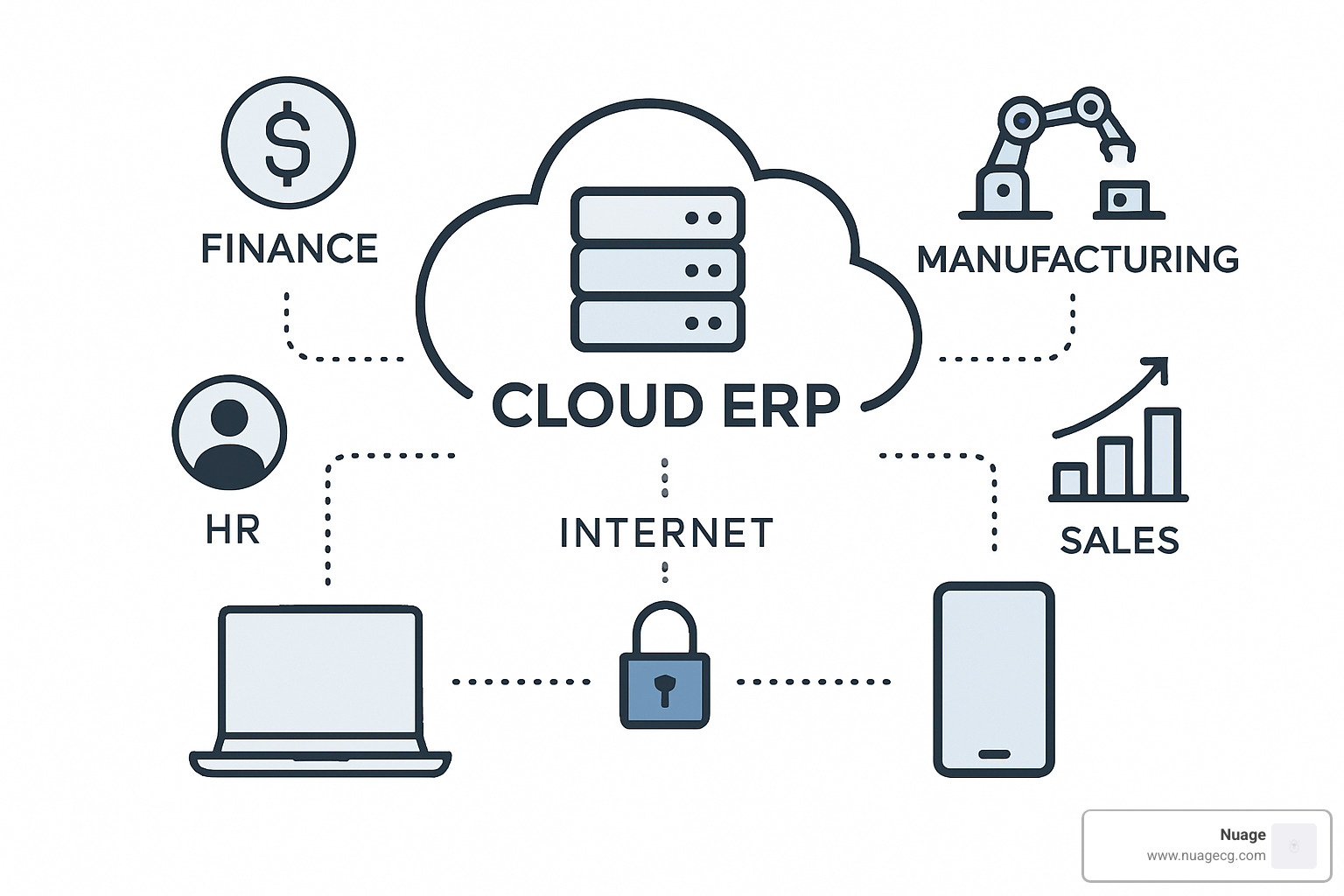
When you use a cloud ERP, you’re essentially tapping into a powerful business engine that handles everything from financials to inventory. Users log in through secure web portals from any device with internet connectivity. Behind the scenes, a centralized database ensures everyone works from the same information—so your sales team sees the same inventory levels as your warehouse staff. Transactions process in real-time, giving you up-to-the-minute insights across all departments.
One of the biggest perks? Automated updates. The vendor handles all maintenance, security patches, and feature improvements without disrupting your operations. And with open application programming interfaces (APIs), your cloud ERP system easily connects with other business tools and third-party applications.
You’ll typically encounter two main deployment models:
Public Cloud serves as the most common and cost-effective option, where infrastructure is shared among multiple clients—think of it as business-class seating on an airplane.
Private Cloud provides dedicated infrastructure for a single organization, offering greater customization but at higher cost—more like chartering your own jet.
As one of our manufacturing clients put it: “Moving to the cloud freed up our IT team to focus on innovation rather than maintenance.” That’s the true power of cloud ERP—it lets you redirect resources toward growth rather than system upkeep.
Cloud ERP vs SaaS vs Hosted: Clearing the Confusion
The terminology around cloud solutions often creates confusion. Let me clear things up with some simple definitions:
Cloud ERP is a broad term for any ERP system delivered via internet connectivity. Think of it as the umbrella category.
SaaS ERP is a specific type of cloud ERP where the software is delivered as a service with subscription pricing, multi-tenant architecture, and vendor-managed updates. This is true cloud computing.
Hosted ERP refers to traditional ERP software installed on remote servers managed by a third party, but often lacking true cloud benefits like automatic updates and multi-tenancy. It’s more like having your own system that just happens to live in someone else’s data center.
This distinction matters because not all “cloud” solutions deliver the same benefits. At Nuage, we often explain to clients that true SaaS ERP provides the greatest value through continuous innovation, seamless updates, and predictable costs.
The licensing models differ significantly too. With SaaS, you never actually own the software—you subscribe to it, similar to how you might subscribe to Netflix rather than buying DVDs. Hosted models typically use traditional perpetual licensing where you own the software but pay someone else to host and manage it. Some businesses opt for hybrid models during transition periods, with some components in the cloud while others remain on-premise.
Understanding these distinctions helps you make more informed decisions about which deployment approach best suits your specific needs.
On-Premise ERP at a Glance
To fully appreciate cloud ERP, it helps to understand the traditional on-premise model it’s replacing:
On-premise systems require significant investment in servers, networking equipment, and data center space—all assets that depreciate over time. Major version upgrades typically occur every 5-10 years, often requiring substantial reinvestment and disruptive implementation projects.
You’ll need dedicated IT staff for system maintenance, security, backups, and troubleshooting. The cost structure includes large upfront license fees plus ongoing maintenance costs (typically 18-22% of license value annually). And perhaps most frustratingly, customizations often create “version lock,” making future upgrades more difficult and expensive.
While on-premise ERP still makes sense in some specific scenarios (such as environments with extremely limited internet connectivity or unique regulatory requirements), the trend is clearly moving toward cloud deployment for most organizations. The flexibility, accessibility, and reduced IT burden make cloud ERP systems increasingly attractive to businesses focused on growth rather than infrastructure management.
At Nuage, we’ve guided numerous companies through the transition from on-premise to cloud ERP systems like NetSuite and IFS Cloud, helping them steer these fundamental differences to find the solution that best supports their business goals.
Benefits, Risks & Security of Cloud ERP
Let’s be honest – the business case for cloud ERP is incredibly compelling. Research consistently shows that cloud ERP systems deliver approximately 30% lower total cost of ownership compared to their on-premise cousins. This significant cost advantage, paired with greater business agility and a dramatically reduced IT burden, explains why 63% of businesses now choose cloud over traditional deployment models.
The ROI numbers tell an impressive story too. Take Unit4, for example – their enterprise solution achieves 30% higher ROI than other ERP options, returning $1.73 for every dollar spent. These aren’t just abstract numbers; they represent real financial benefits stemming from both direct cost savings and meaningful operational improvements.
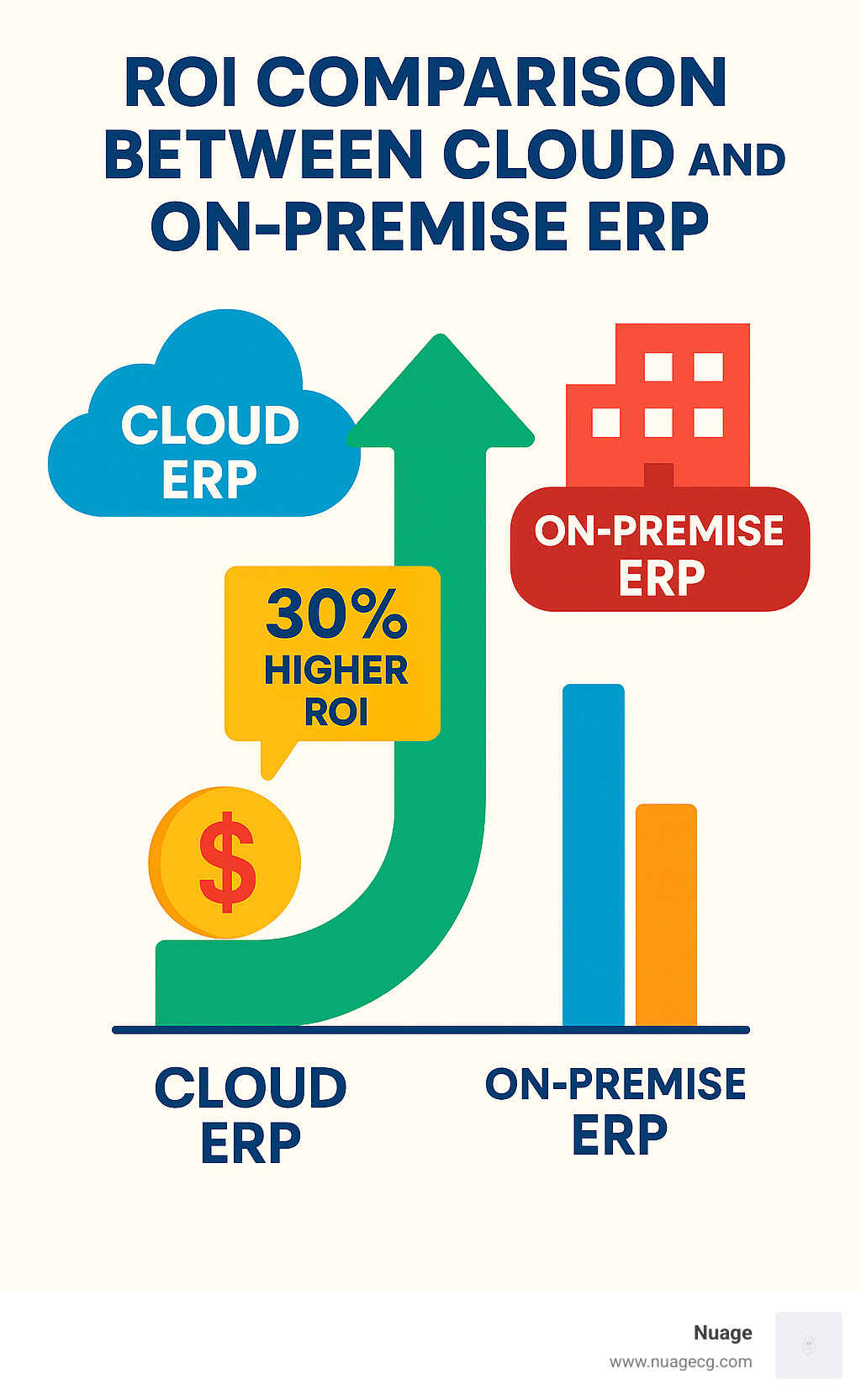
When it comes to reliability, leading cloud ERP system providers typically guarantee 99.999% uptime. That translates to less than 8 minutes of unplanned downtime per year – a level of reliability that most internal IT departments simply can’t match, no matter how talented they are.
Of course, the cloud isn’t just about cost savings and uptime. Organizations must also carefully consider factors like data sovereignty (where your data physically resides) and compliance with industry-specific regulations. These considerations are especially important for manufacturing and food & beverage companies dealing with complex regulatory requirements.
Top Business Benefits You Can Expect
When implementing a cloud ERP system, your organization will likely experience several transformative benefits that directly impact your bottom line and operational efficiency.
Lower upfront costs immediately stand out as a major advantage. By eliminating hardware purchases and reducing implementation timeframes, you’ll see a faster time-to-value than with traditional systems. This shift from capital expenditure to operational expense can free up resources for other strategic initiatives.
Scalability on demand becomes your new reality. As your business grows, you can easily add users, modules, or capacity without worrying about infrastructure constraints. This flexibility is particularly valuable for seasonal businesses or companies experiencing rapid growth.
Anywhere, anytime access supports today’s increasingly remote and distributed workforces. Your team can securely access critical business information from any internet-connected device, whether they’re on the factory floor, visiting clients, or working from home.
Faster implementation is another significant advantage. Cloud deployments typically complete 20-40% faster than on-premise projects, getting your business up and running more quickly. At Nuage, we’ve seen implementations that would have taken a year on-premise completed in just months with cloud solutions.
Automatic updates keep you current with the latest features and security patches without disruptive upgrade cycles. This continuous improvement model means you’re always working with the most current version of your software.
For manufacturing and food & beverage companies specifically, cloud ERP systems deliver additional industry-specific benefits like improved supply chain visibility, better production planning, and improved quality control. Learn more about cloud benefits for manufacturing businesses.
Potential Risks and How to Mitigate Them
While the benefits are substantial, I’d be doing you a disservice if I didn’t address potential challenges. The good news? With proper planning, these risks can be effectively managed.
Change management challenges remain significant even with cloud implementations. A cloud ERP system still represents major organizational change that must be carefully managed. We recommend developing comprehensive training programs and ensuring strong executive sponsorship to smooth the transition.
Data migration complexity can surprise unprepared organizations. Moving data from legacy systems is rarely as simple as it first appears. Start your data cleansing early and use proven migration methodologies to avoid headaches down the road.
Vendor lock-in concerns are valid – switching cloud ERP providers can be difficult once you’re deeply integrated. Mitigate this by thoroughly evaluating vendor stability, roadmap alignment, and potential exit strategies during your selection process.
Implementation delays can happen without proper planning. Even cloud implementations face timeline challenges when not managed effectively. Using phased approaches and setting realistic expectations will help keep your project on track.
Internet dependency is an inherent aspect of cloud solutions. Implement redundant connections and consider offline capabilities for business-critical functions to maintain operations during connectivity issues.
At Nuage, we’ve developed proven methodologies to address these challenges, drawing on our 20+ years of ERP implementation experience. Our approach emphasizes thorough planning, stakeholder engagement, and phased rollouts to minimize risks and maximize success.
How Secure Is a Cloud ERP System?
Security concerns often top the list when organizations consider cloud ERP. But here’s the reality that might surprise you: a well-implemented cloud ERP system is typically more secure than on-premise alternatives, especially for midsize businesses.
Reputable cloud ERP providers invest millions in security infrastructure that would be prohibitively expensive for individual companies to replicate. They offer professional security teams providing 24×7 monitoring by dedicated security experts who specialize in protecting your data.
Regular audits and certifications like SOC 1, SOC 2, ISO 27001, and other industry standards ensure that providers maintain the highest security standards. These rigorous third-party assessments provide peace of mind that your data is well-protected.
Comprehensive encryption of data both in transit and at rest means your sensitive information remains protected from unauthorized access. This is complemented by advanced identity management features including multi-factor authentication and role-based access controls.
The security ROI is particularly compelling when considering the potential costs of data breaches, downtime, and compliance violations. As one of our manufacturing clients put it, “We sleep better at night knowing our data is protected by security professionals rather than relying on our small IT team to keep up with evolving threats.”
For midsize businesses, these enterprise-grade security measures often represent a significant upgrade from what they could implement internally. By leveraging the security expertise and infrastructure of cloud providers, you can achieve better protection at lower cost – a rare win-win in today’s challenging business environment.
For more information on the hidden costs of traditional ERP systems and how cloud solutions address them, check out Acumatica’s research on the 7 hidden costs of ERP. Additionally, organizations concerned with financial reporting standards should review the International Financial Reporting Standards for guidance on compliance requirements that modern cloud ERP systems can help address.
Key Features and Modules to Expect in a Modern Cloud ERP
A comprehensive cloud ERP system brings multiple business functions together under one digital roof. Think of it as breaking down the walls between departments and creating a space where information flows freely across your entire organization.
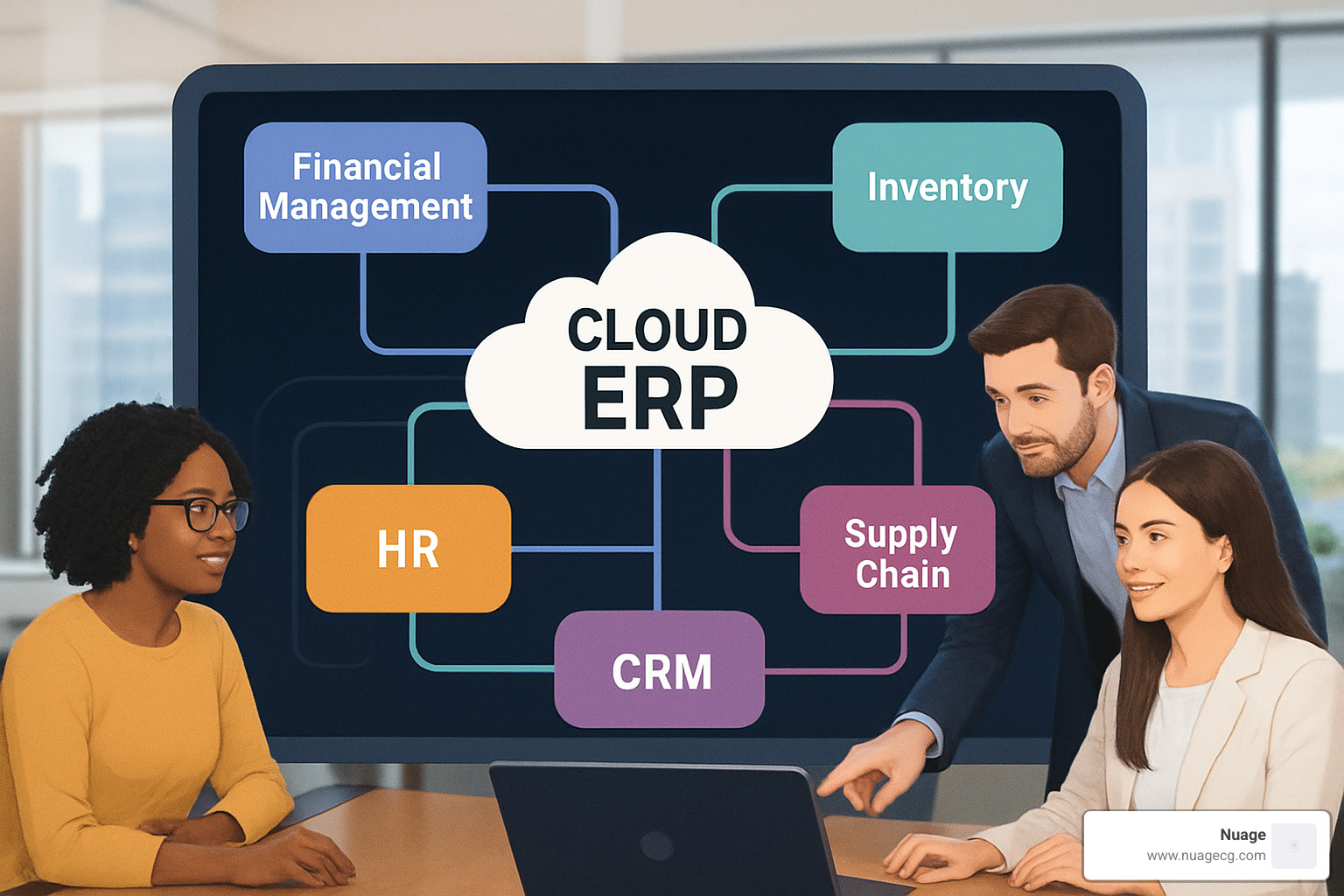
Core Modules That Drive Value
At the heart of every modern cloud ERP system are essential modules that handle your day-to-day operations. The financial management suite serves as the backbone, giving you complete visibility into your general ledger, accounts payable/receivable, and financial reporting. With multi-currency and multi-entity support, you can manage complex financial structures without breaking a sweat.
Supply chain management transforms how you handle inventory, procurement, and order fulfillment. Imagine knowing exactly what’s in your warehouse, what’s on order, and what’s needed—all in real-time. One manufacturing client told us, “It’s like having x-ray vision into our entire supply chain.”
For manufacturers, production planning becomes vastly more efficient. Your bill of materials, routing, and shop floor control all work in harmony, eliminating the frustration of disconnected systems. Quality management tools ensure you’re meeting standards at every step.
Human resources modules handle everything from basic personnel management to complex payroll processing. Time tracking, benefits administration, and organizational charts keep your team running smoothly while reducing administrative headaches.
The customer relationship management features round out the core functionality, helping you track contacts, manage sales opportunities, process orders, and provide stellar customer service—all while feeding data back to your financial systems.
What makes these modules truly powerful isn’t just what they do individually, but how they work together. When a sales order comes in, it automatically triggers inventory checks, production scheduling, procurement requests, and financial updates without anyone lifting a finger.
Advanced Tools for Innovation
Today’s cloud ERP system goes far beyond basic business management. Artificial intelligence and machine learning capabilities now power predictive analytics that can forecast demand with remarkable accuracy. Anomaly detection helps prevent fraud before it happens, while intelligent automation handles routine tasks without human intervention.
Internet of Things (IoT) integration is changing the game for manufacturers. By connecting equipment directly to your ERP, you can monitor performance in real-time, predict maintenance needs before breakdowns occur, automate quality control, and optimize energy usage. As one client put it, “Our machines now tell us when they need attention—before they break down.”
Low-code/no-code extensibility puts customization power in your hands. You can build custom applications, personalize dashboards, and modify workflows without needing a programmer on speed dial. This democratization of technology means your team can adapt the system to evolving business needs without expensive custom development.
Advanced analytics turns your data into actionable insights through intuitive dashboards, self-service reporting, and embedded analytics that appear right where you need them—within the transactions themselves. Data visualization tools make complex information immediately understandable, helping teams make better decisions faster.
Industry-Specific Extensions
While a core cloud ERP system works for most businesses, certain industries have unique requirements that need specialized functionality. For manufacturing companies, shop floor data collection and material requirements planning (MRP) are non-negotiable. Product lifecycle management and capacity planning tools help optimize production and resource allocation.
Food and beverage producers face distinct challenges around recipe management, lot traceability, and recall management. Shelf-life tracking and compliance with food safety regulations aren’t just nice-to-haves—they’re essential for operating legally and protecting consumers.
Professional service organizations rely heavily on project accounting, resource utilization tracking, and specialized billing models. Time and expense tracking feeds directly into both project management and financial systems, providing a complete picture of project profitability.
At Nuage, we’ve spent over two decades specializing in implementing cloud ERP systems for manufacturing and food & beverage companies. We understand the unique requirements these industries face and how to configure systems to meet those needs. Our expertise goes beyond just software implementation—we help transform how your business operates.
Want to learn more about how these systems can specifically benefit manufacturing operations? Check out our detailed guide on ERP solutions for manufacturing.
Selecting and Implementing the Right Cloud ERP
Finding your perfect cloud ERP system match is a bit like finding a life partner – it needs to fit your current needs while being adaptable enough to grow with you. The journey begins with honest self-reflection about what your business truly needs today and where you’re headed tomorrow.
Start by gathering requirements from across your organization. What pain points do your finance team face? How does manufacturing track production? What keeps your sales team up at night? These insights form the foundation of your ERP wishlist:
- Functional Requirements: The essential business processes you need supported
- Technical Requirements: How it will connect with other systems and perform at scale
- User Requirements: Who needs access and how they’ll use the system
- Growth Plans: Where your business is headed in the next 3-5 years
- Industry-Specific Needs: Those unique requirements that make your business special
With this roadmap in hand, you can narrow down potential solutions that align with your vision.
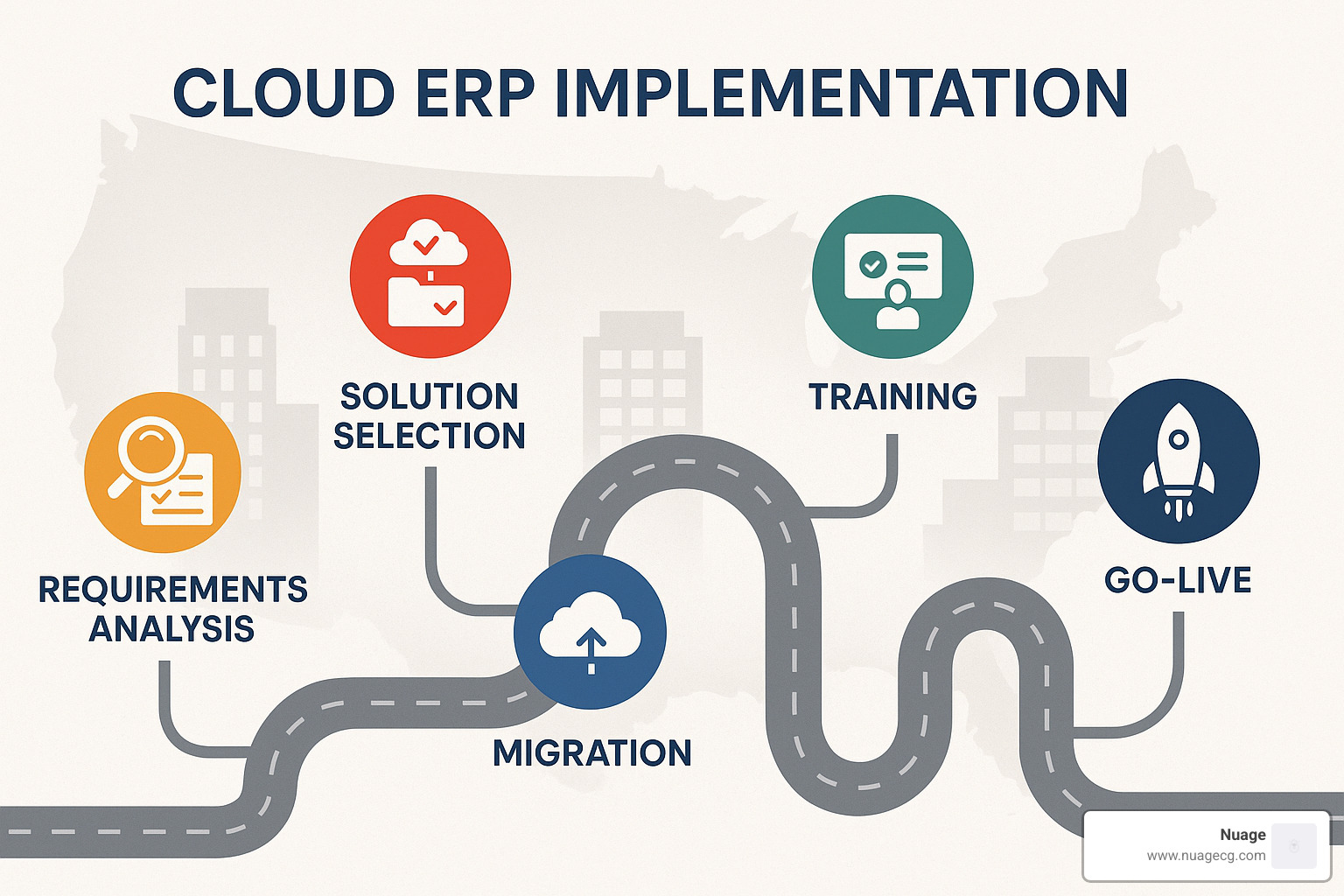
Evaluation Criteria and Cost Structure
When comparing cloud ERP system options, think beyond just features and price. Functional fit is crucial—does the system handle your core processes neatly or force you into awkward workarounds? Usability matters tremendously; even the most powerful system fails if your team finds it frustrating to use.
Look for flexibility that allows the system to adapt as your business evolves. Strong integration capabilities ensure your ERP plays nicely with other business applications. Don’t overlook vendor viability—you’re entering a long-term relationship, so you want a partner with staying power and a clear vision for the future.
The best validation comes from peers. Ask for customer references in your industry and of similar size. Their candid feedback about implementation challenges and ongoing support is pure gold.
Understanding cloud ERP pricing helps avoid surprises. Unlike the large upfront license of traditional ERP, cloud models spread costs over time through subscriptions. These typically include user licenses (often tiered by access level), module subscriptions for specific functionality, implementation services, data migration assistance, integration work, and ongoing support.
Remember to calculate your total cost of ownership over at least five years. The subscription might seem higher monthly than a traditional license payment would have been, but you’re also eliminating server costs, IT overhead, and those painful upgrade projects. Learn more about what to expect during NetSuite ERP implementation.
Implementation Best Practices for Success
After 20+ years guiding companies through ERP implementations, we’ve learned what separates successful projects from challenging ones. It starts with strong executive sponsorship—when leadership visibly champions the project, teams prioritize it accordingly.
Set clear objectives with measurable outcomes. Is it reducing order fulfillment time by 30%? Improving inventory accuracy to 99%? These concrete goals keep everyone focused on business value rather than just technical completion.
Be realistic about timelines. Cloud ERP system implementations move faster than traditional on-premise projects, but still require adequate time for thoughtful configuration, testing, and change management. A rushed implementation rarely delivers optimal results.
Data cleansing is the unglamorous hero of successful implementations. Address quality issues in your current systems before migration rather than bringing those problems into your clean new environment.
Use this opportunity for process optimization. The worst approach is automating inefficient processes; instead, reimagine how work should flow in your ideal state. Your cloud ERP system should enable your best practices, not perpetuate outdated ones.
Never underestimate the human side of technology change. Change management isn’t a nice-to-have—it’s essential for adoption. People naturally resist change, so invest in communication, training, and addressing concerns openly.
Consider a phased approach rather than switching everything at once. This reduces risk and allows your team to build confidence with early wins. Comprehensive testing of critical processes prevents nasty surprises at go-live. And plan for robust post-implementation support as users adapt to new ways of working.
At Nuage, we’ve refined these practices through hundreds of successful implementations across manufacturing and food & beverage companies. Find more about different ERP implementation approaches.
Integration and Scalability Considerations
Your cloud ERP system needs to play well with others. Few companies run exclusively on ERP—you likely have e-commerce platforms, CRM systems, specialized production tools, or industry-specific applications that need to share information.
Before selecting a system, examine its API capabilities. Modern cloud ERPs should offer robust, well-documented APIs that facilitate connections to other systems. Look for pre-built connectors to common applications that can save significant integration time and cost. Understand what integration tools are available, whether native to the ERP or through third-party middleware.
Consider your integration timing needs—does data need to flow in real-time, or are daily batch updates sufficient? And don’t underestimate the complexity of data mapping between systems with different field structures and business rules.
As your business grows, your ERP should grow with you without painful transitions. User scalability is the most obvious consideration—can you easily add users as your team expands? But also consider transaction volume scalability. A system that performs beautifully with your current order volume might struggle when you double or triple that load.
For companies with international ambitions, global expansion capabilities are crucial—support for multiple languages, currencies, and tax regimes can make expansion much smoother. Similarly, if you might acquire companies or launch new divisions, robust subsidiary management is important.
At Nuage, we help clients develop holistic technology strategies that connect their cloud ERP system with their broader business ecosystem while ensuring room to grow. Our deep experience with both NetSuite and IFS Cloud lets us guide you to the solution that best fits your unique needs—today and tomorrow.
Leading Cloud ERP Vendors and Market Landscape
The cloud ERP landscape has truly come into its own in recent years. We’re seeing established leaders continuing to innovate alongside ambitious challengers, all while the market grows at impressive double-digit rates. This growth reflects the ongoing shift as organizations move away from legacy systems toward more flexible, powerful cloud solutions.
At Nuage, we’ve carefully chosen our partnerships with two exceptional providers: NetSuite and IFS Cloud. Both consistently rank as leaders in their respective market segments, though they serve different organizational needs beautifully. NetSuite delivers exceptional value for midmarket companies across various industries, while IFS Cloud shines with its deep functionality for asset-intensive and project-based businesses.
What’s particularly impressive is the ROI these solutions deliver. Independent analyst rankings consistently place them among top performers, with customers reporting up to 30% higher return on investment compared to alternative ERP solutions. This superior return doesn’t happen by accident—it stems from faster implementation times, significantly lower infrastructure costs, and the meaningful operational improvements these systems enable.
Why NetSuite Remains a Benchmark Cloud ERP System
NetSuite holds a special place in the industry as the world’s first true cloud ERP solution. As pioneers of the SaaS model for business applications, they’ve built a cloud ERP system with several distinct advantages that continue to set the standard today.
NetSuite’s unified suite approach means you’re working with a single, integrated platform that spans financials, CRM, e-commerce, and more—no cobbling together different systems with fragile connections. Their multi-tenant architecture ensures all customers run on the same version, enabling continuous innovation without disruptive upgrades.
The bi-annual automatic updates happen seamlessly, without disrupting your operations, keeping you current with new features and security improvements. For companies with global aspirations, NetSuite’s support for multiple languages, currencies, and tax regimes removes major barriers to international expansion.
What really sets NetSuite apart for growing midmarket companies is how it eliminates the integration challenges that typically plague businesses using multiple point solutions. That “single source of truth” across the organization isn’t just a nice theory—it’s a practical reality that transforms how teams collaborate and make decisions.
In our years implementing NetSuite at Nuage, we’ve seen remarkable improvements for clients across industries—financial close times shrinking from weeks to days, order processing efficiency jumping dramatically, and leadership finally gaining the business visibility they’ve been seeking for years. Learn more about our NetSuite expertise.
For a deeper understanding of NetSuite’s capabilities directly from the source, visit Oracle NetSuite’s official website to explore their full suite of cloud-based business management solutions.
IFS Cloud for Complex, Asset-Intensive Industries
IFS Cloud takes a different approach as a comprehensive cloud ERP system designed specifically with asset-intensive and project-centric industries in mind. If you’re in manufacturing, construction, or field service, IFS Cloud speaks your language.
What makes IFS Cloud special is its project-centric architecture—it’s built around projects as a core organizing principle, which aligns perfectly with how project-based businesses actually operate. For organizations managing valuable equipment, its asset lifecycle management capabilities provide comprehensive support from acquisition through maintenance and eventual replacement.
The manufacturing depth in IFS Cloud is particularly impressive, with robust production planning, MRP, and shop floor control that handles real-world complexity. For service organizations, IFS offers industry-leading field service management that keeps technicians productive and customers happy.
IFS Cloud’s component architecture allows for targeted implementation—you can start with just what you need and expand over time. This approach, combined with embedded AI-powered analytics, creates a system that grows with your business while continuously delivering actionable insights.
We’ve seen IFS Cloud transform operations for manufacturers and asset-intensive businesses, helping them achieve significant improvements in operational efficiency and project profitability. The system excels particularly in mixed-mode manufacturing environments where you might be juggling make-to-stock, make-to-order, and engineer-to-order approaches simultaneously. Learn more about our IFS Cloud expertise.
To explore IFS Cloud’s capabilities in greater detail, visit IFS’s official website for comprehensive information about their cloud ERP solution.
How to Shortlist Vendors Efficiently
With so many cloud ERP options available, how do you cut through the noise and find your best match? In our experience at Nuage, developing an efficient shortlisting process saves tremendous time and helps ensure you find the right fit.
Start with industry-specific RFP templates to ensure you’re covering all critical requirements. These templates help you avoid the common pitfall of finding major functional gaps late in the selection process.
When you’re ready for demonstrations, develop standardized scripts focused on your most critical processes. This approach makes comparing different vendors much more meaningful than letting each vendor show their favorite features.
Don’t skip reference checks with existing customers in similar industries and of similar size. These conversations often reveal insights about implementation experiences and ongoing support that vendors won’t volunteer.
Carefully review service level agreements, particularly around uptime guarantees, support response times, and data ownership. The fine print matters tremendously when you’re entrusting your business operations to a cloud provider.
Assess the ecosystem surrounding each solution—available partners, pre-built integrations, and extensions can dramatically impact your long-term success. Similarly, evaluate the availability of qualified implementation partners who understand both the software and your industry.
Finally, develop a 5-year total cost of ownership model for each shortlisted solution. This longer-term view often reveals significant differences that aren’t apparent when looking only at initial implementation costs.
At Nuage, we guide clients through this process efficiently, leveraging our deep knowledge of the cloud ERP landscape to identify best-fit solutions based on their specific requirements and industry context. Our goal isn’t to sell you a particular software package—it’s to help you find the right solution for your unique business needs.
The Future of Cloud ERP & Digital Change
The cloud ERP system landscape is evolving at a breathtaking pace, opening exciting new possibilities for businesses ready to accept change. As someone who’s witnessed many technology shifts over the years, I can tell you – what’s coming next isn’t just incremental improvement, it’s change.
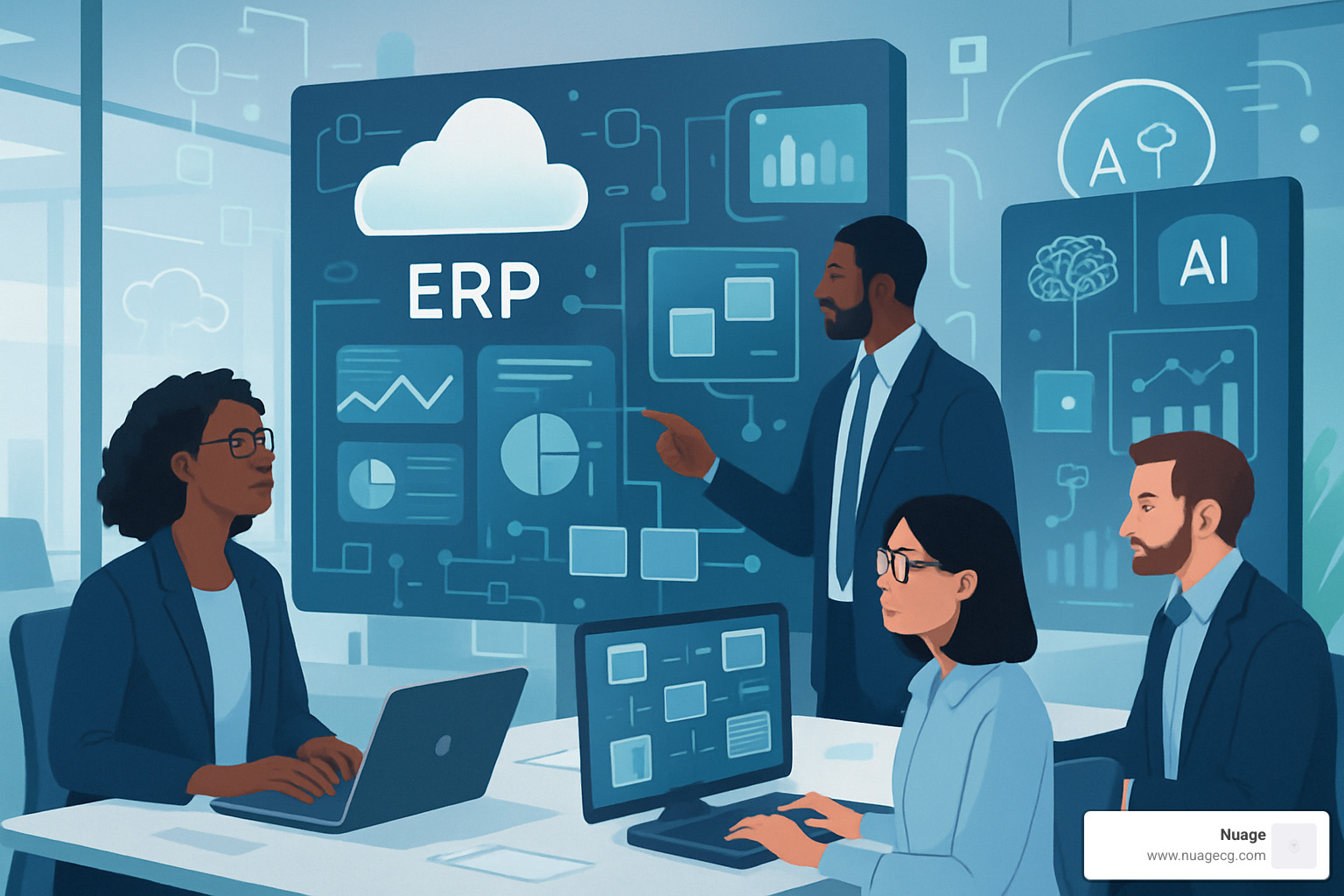
Remember when smartphones first appeared and we thought, “neat, but what’s the big deal?” Then suddenly they changed everything about how we live and work. That’s where we stand with cloud ERP today – on the cusp of changes that will fundamentally reshape how businesses operate.
AI copilots and assistants are perhaps the most exciting development we’re seeing. Imagine having a digital colleague that not only handles routine tasks but actually suggests better approaches based on your company’s historical data. One manufacturing client recently told me, “It’s like having an expert looking over my shoulder, but one who never gets tired or takes vacation.”
Blockchain technology is finally moving beyond the hype into practical applications, especially for supply chain traceability. For food and beverage companies, this means the ability to track ingredients from farm to table with absolute certainty – a game-changer for quality control and regulatory compliance.
The shift toward composable ERP reflects a more flexible, modular approach that lets businesses assemble exactly the right mix of capabilities rather than forcing everyone into the same rigid system. Think of it as building with Lego blocks instead of having to accept a pre-built structure.
We’re also seeing growing demand for sustainability analytics as businesses face increasing pressure to measure and reduce their environmental impact. Modern cloud ERP systems are stepping up with tools that make sustainability reporting straightforward rather than a burdensome add-on process.
For companies with distributed teams (and who doesn’t have those these days?), improved remote collaboration features are breaking down the final barriers to effective teamwork across locations. As one client put it, “Geography just doesn’t matter anymore.”
How a Cloud ERP System Fuels Continuous Innovation
The beauty of a cloud ERP system is that innovation never stops. Unlike traditional systems where you’d wait years between major updates (and dread the disruption they caused), cloud ERP delivers improvements through regular, seamless updates.
This continuous innovation cycle is transformative. Remember the days when updating your ERP meant months of planning, testing, and weekend cutover work? Those days are gone. Now, new capabilities appear in your system regularly – typically every quarter – with minimal disruption.
The benefits are profound. Your business gains faster access to new technologies like AI and machine learning without waiting for major upgrades or additional investments. These smaller, more frequent updates create less disruption to your operations while simultaneously reducing risk. Vendors can introduce and refine features incrementally based on real customer feedback rather than making massive, potentially disruptive changes all at once.
This approach creates a genuine competitive advantage for cloud ERP users. While competitors using traditional systems might be stuck with outdated capabilities for years, your business can quickly adopt and leverage new features as they’re released. It’s like having a car that automatically upgrades itself every few months rather than requiring you to buy a new model.
The ecosystem surrounding cloud ERP further accelerates innovation through marketplace extensions and low-code platforms. These tools allow you to extend your core ERP with specialized capabilities while maintaining the benefits of a unified system – the best of both worlds.
At Nuage, we don’t just help clients implement cloud ERP systems; we help them develop strategies to leverage these continuous innovations for ongoing business improvement. With our deep expertise in both NetSuite and IFS Cloud, we’re uniquely positioned to help you not just keep pace with change, but get ahead of it.
The future of cloud ERP isn’t just about better software – it’s about enabling your business to adapt faster, work smarter, and turn technological change into competitive advantage. And in today’s business environment, that ability to accept change might be the most valuable advantage of all.
Frequently Asked Questions on Cloud ERP
What is the difference between cloud ERP and SaaS ERP?
I hear this question all the time from our clients, and it’s a great one! While these terms are often tossed around interchangeably in conversation, they actually represent different concepts:
A cloud ERP system is the broader umbrella term covering any ERP solution accessed via the internet. Think of it as the “where” your software lives—out there in the cloud rather than on your office servers. Cloud ERP can take several forms, from private cloud deployments to hosted solutions to true SaaS offerings.
SaaS ERP, on the other hand, refers specifically to a multi-tenant, subscription-based delivery model. This is where the vendor (like NetSuite or IFS Cloud) handles all the behind-the-scenes work: maintaining the infrastructure, rolling out updates, and managing security. It’s essentially the “how” your software is delivered and maintained.
The key differences show up in three main areas:
Licensing and payment – SaaS follows a subscription model (like Netflix), while traditional hosted solutions often use perpetual licensing where you “own” the software.
System ownership – With SaaS, the vendor owns and maintains everything. With hosted cloud ERP, you own the software license but pay someone else to host it.
Upgrade cycles – SaaS solutions update automatically for everyone at once (typically quarterly), while hosted solutions let you control when upgrades happen—which sounds nice until you’re still running that outdated version three years later!
In our experience at Nuage, true SaaS solutions typically deliver the best long-term value for most organizations. The continuous innovation and lower IT overhead simply make more business sense in today’s fast-moving environment.
How much does a cloud ERP system cost?
This is probably the most common question we hear, and I wish I could give you a simple answer! The truth is, cloud ERP system pricing varies widely based on several factors:
Subscription tiers play a major role in determining your costs. Most vendors offer different packages with varying capabilities—from basic financial management to comprehensive enterprise suites with advanced features.
User counts directly impact your subscription fees. Most vendors charge based on the number of users who need access, sometimes with different rates for full users versus limited-access roles.
Implementation services form a significant part of your initial investment. This includes system configuration, data migration, process design, training, and go-live support. While cloud ERP requires less implementation work than traditional on-premise systems, proper setup remains crucial for success.
Hidden expenses can catch you by surprise if you’re not careful. Watch for things like additional storage costs, premium support fees, sandbox environments for testing, and integration costs for connecting with other systems.
At Nuage, we believe in transparency. We work with clients to develop comprehensive budgets that account for all these factors, preventing unpleasant surprises down the road. We can help you understand not just the initial costs, but the total value your business will receive from your investment.
How long does implementation usually take?
“How quickly can we go live?” is always an exciting question! The honest answer is that cloud ERP system implementations typically take anywhere from 3 to 12 months, with several factors influencing where you’ll fall on that spectrum:
Organization size matters significantly. A 30-person company might complete implementation in 3-4 months, while a 500-person enterprise with multiple locations could need 9-12 months or more.
Business complexity plays a huge role too. A straightforward distribution business with standard processes will implement faster than a custom manufacturer with complex production workflows, multiple subsidiaries, and industry-specific compliance requirements.
Data quality and migration needs can either accelerate or delay your timeline. Clean, well-organized data from modern systems transfers more easily than fragmented data from legacy systems or spreadsheets.
Your team’s availability makes a tremendous difference. Companies that can dedicate key personnel to the project typically see faster, more successful implementations than those trying to squeeze the project in alongside day-to-day responsibilities.
In our experience at Nuage, a phased approach often delivers the best results. Start with core financials and critical operations, then add additional capabilities in subsequent phases. This approach lets you start seeing benefits sooner while managing change more effectively.
After 20+ years in the ERP implementation business, we’ve developed methodologies that help predict and prevent the common pitfalls that can extend timelines. Our clients appreciate that we’re realistic about timeframes from the beginning—promising a 60-day implementation might sound appealing, but it rarely reflects reality for most businesses making a significant system change.
Conclusion
The journey to a successful cloud ERP system implementation requires careful planning, expert guidance, and ongoing optimization. As we’ve explored throughout this guide, cloud ERP offers compelling advantages over traditional on-premise solutions—from lower total cost of ownership and greater agility to improved security and continuous innovation.
For manufacturing and food & beverage companies in particular, cloud ERP provides the foundation for digital change, enabling more efficient operations, better customer service, and data-driven decision making. The ability to access critical business information anytime, anywhere supports today’s increasingly distributed workforces and complex supply chains.
When we work with clients at Nuage, we often find that the lightbulb moment comes when they realize cloud ERP isn’t just about technology—it’s about open uping new possibilities for their business. One manufacturing client recently told us, “We thought we were buying software, but what we really got was a platform for growth.”
The evidence is clear: with approximately 30% lower TCO and faster implementation timelines, cloud ERP systems provide better ROI for most organizations. The security advantages are equally compelling—professional 24/7 monitoring and management typically exceeds what organizations can achieve internally, turning what was once a concern into a strength.
We’ve seen how integration capabilities make all the difference in maximizing value. When your cloud ERP connects seamlessly with other business systems, you create a unified digital ecosystem that eliminates data silos and streamlines operations. This connectivity becomes increasingly valuable as businesses adopt more specialized tools alongside their core ERP.
Your implementation approach matters tremendously. Thorough planning and thoughtful change management aren’t just nice-to-haves—they’re critical success factors that determine whether your project thrives or struggles. The most successful implementations we’ve led have all shared a common thread: strong executive sponsorship and clear communication throughout the organization.
Perhaps most exciting is the continuous innovation that comes with cloud ERP’s regular update cycle. Rather than disruptive upgrades every few years, you receive ongoing improvements that keep your business at the cutting edge without the pain of major version migrations.
At Nuage, we bring over 20 years of ERP implementation experience to help organizations steer their cloud ERP journey. Our team of experts specializes in NetSuite and IFS Cloud implementations for manufacturing and food & beverage companies, providing end-to-end services from selection through implementation and ongoing support.
As a trusted partner with offices in Manhattan Beach, CA and Ponte Vedra, FL, we focus on delivering solutions that drive tangible business value—not just selling software. We believe in understanding your unique business requirements first, then aligning technology to support your strategic objectives.
Ready to explore how a cloud ERP system can transform your business? Contact us today to discuss your specific needs and find how our expertise can help you achieve your goals. Your digital change journey deserves a partner who understands both the technology and your business—and that’s exactly what we deliver at Nuage.
